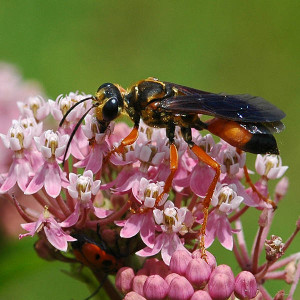Solitary Ground Digger Wasps Are Not a Threat
By Chris Williams on July 17, 2015.
All of a sudden we have a bunch of large wasps going in and out of many holes in our yard. A pest control company said they were digger wasps but they didn’t recommend using insecticides to kill them. Why not? I really don’t like having them around.
T. W., Revere, MA
 Digger wasps are generally considered to be beneficial, and the gardener’s friends, because they prey on insects. The most common digger wasp in our area of New Hampshire and Massachusetts is the great golden digger wasp, Sphex ichneumoneus. It’s about an inch long with an orange-brown, yellow and black body with yellow hairs on the thorax and head, and metallic blue wings. It preys on grasshoppers, katydids, and crickets, and also pollinates flowers.
Digger wasps are generally considered to be beneficial, and the gardener’s friends, because they prey on insects. The most common digger wasp in our area of New Hampshire and Massachusetts is the great golden digger wasp, Sphex ichneumoneus. It’s about an inch long with an orange-brown, yellow and black body with yellow hairs on the thorax and head, and metallic blue wings. It preys on grasshoppers, katydids, and crickets, and also pollinates flowers.
Beneficial Digger Wasps Do Not Live in Colonies
Digger wasps are solitary wasps which means that there is no colony with lots of workers. When there are many holes in an area, it is because other digger wasps are also attracted to the same type of soil conditions. Each ground burrow hole is about the diameter of a pencil and is the work of only one female wasp, although one female can dig multiple holes.
In June, July, and August, digger wasps can be seen flying low over the ground during the day. The females are busy digging nest holes and provisioning them with grasshoppers or crickets for their larvae to feed on. When each hole is stuffed with insects, the female lays a single egg and moves on to dig another burrow. The young wasps remain in the ground until the following year.
Digger wasps (and the related digger bees) are not aggressive and can usually peacefully coexist in a yard. We recommend control of these beneficial insects when 1) they are nesting in an area where small children or pets might accidentally step on them, 2) there are so many that their holes are destroying the yard, or 3) if someone in the home is allergic to stings. Of course, if a customer really wants the digger wasps gone, we can treat the nest holes to kill the wasps.
Change Your Yard to Make it Less Wasp-Friendly
If you don’t enjoy playing host to digger wasps or bees, there are steps you can take to prevent them from colonizing your yard in the first place. They prefer to burrow in well-drained, sandy soil (the easier to dig) in open, sunny areas with little vegetation. If you have sandy soil and barren, or almost barren, areas in your yard, that’s where you will have digger wasp holes. You can reduce ground burrows from digger wasps or ground-nesting bees by:
- Mixing in top soil or other material to make the soil less sandy.
- Making the surface less desirable for digging by applying a layer of mulch to the surface (this is an option where you can’t grow grass).
- Planting grass or other plant cover in those bare areas, or fertilizing and watering the grass that is already there so it fills in.
For information on the related ground-nesting bees, see our blog, Bees That Nest in Lawns Are Docile.
For information on another larger ground wasp, see this blog, Cicada Killers Are Our Biggest Wasps.
Photo Credit: By Tom D. Schultz ([1]) [see page for license], via Wikimedia Commons